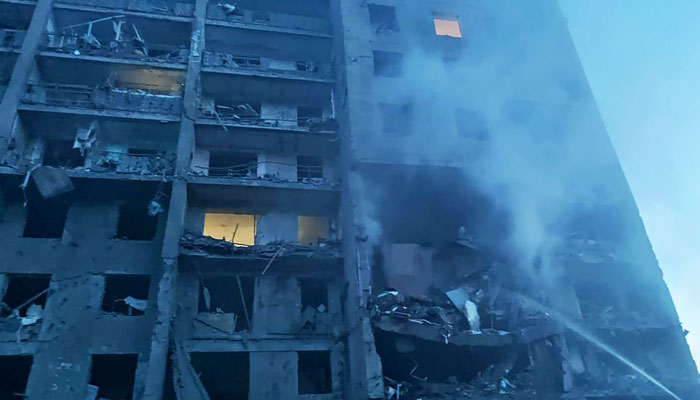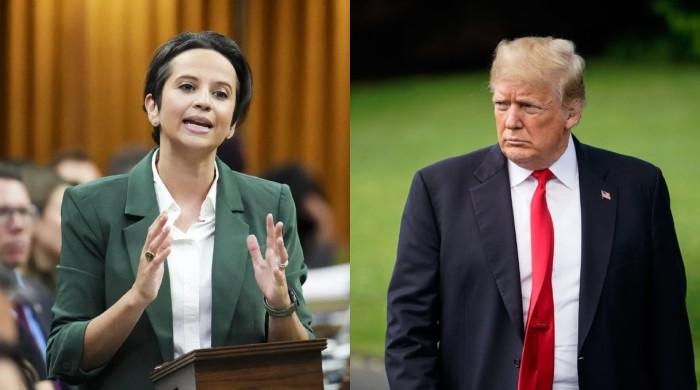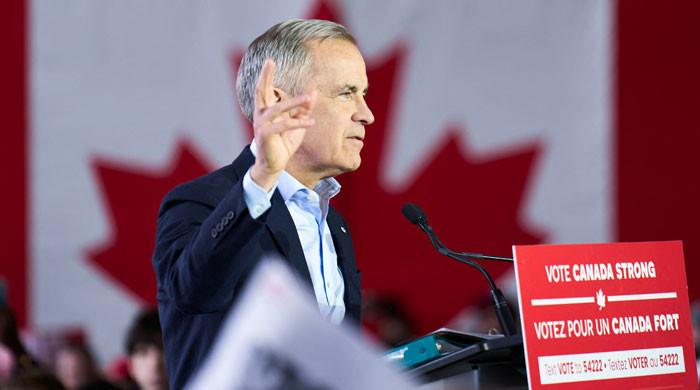Ukraine says Russian missiles kill 21 near Odessa
Strikes follow global outrage earlier this week when a Russian strike destroyed a shopping centre in Kremenchuk
July 01, 2022

- Missiles struck two buildings in the town of Sergiyvka about 80 kilometres south of the Black Sea port of Odessa.
- Ukrainian urged allies to send Kyiv modern missile defence systems as soon as possible.
- Strikes follow global outrage earlier this week when a Russian strike destroyed a shopping centre in Kremenchuk.
SERGIYVKA: Missiles slammed into a Ukrainian apartment building and a recreation centre early Friday, killing 21 people and wounding dozens in the Odessa region, in attacks swiftly condemned by Germany.
At least one child was killed, Ukrainian officials said, blaming the strikes on Russia a day after Moscow abandoned positions on a strategic island in a major setback to the Kremlin's invasion.
The missiles struck the two buildings in the town of Sergiyvka about 80 kilometres (50 miles) south of the Black Sea port of Odessa, which has become a strategic flashpoint in the now more than four-month-old war.
"The death toll in Odessa blast rose to 21," Sergiy Bratchuk, Odessa deputy chief of district, told Ukrainian television. A 12-year-old boy was among the dead, he added.
Ukraine's emergency services ministry said 16 people were killed at the block of flats and five others, including a child, at the recreation centre.
Thirty-nine people were taken to hospital. The injured included six children, the ministry added.
The strikes were launched by aircraft that flew in from the Black Sea, Bratchuk said.
"The worst-case scenario played out and two strategic aircraft came to the Odessa region," he said in a television interview, adding they had fired "very heavy and very powerful" missiles.
Russia made no immediate comment on the strikes.
'Inhuman'
Ukrainian Foreign Minister Dmytro Kuleba urged allies to send Kyiv "modern missile defence systems as soon as possible. Help us save lives and put an end to this war."
"The cruel manner in which the Russian aggressor takes the deaths of civilians in its stride and is again speaking of collateral damages is inhuman and cynical," said German government spokesman Steffen Hebestreit.
The strikes follow global outrage earlier this week when a Russian strike destroyed a shopping centre in Kremenchuk, central Ukraine, killing at least 18 civilians. President Vladimir Putin has denied Moscow´s forces were responsible.
On Friday, Ukrainian President Volodymyr Zelensky hailed a "new" chapter of "history" with the European Union, after Brussels recently granted Ukraine candidate status in Kyiv's push to join the 27-member bloc, even if membership is likely years away.
"Our journey to membership shouldn't take decades. We should make it down this road quickly," Zelensky told Ukraine's parliament.
The president of the European Commission Ursula von der Leyen told Ukrainian lawmakers that membership was "within reach" but urged them to make anti-corruption reforms.
Norway, which is not an EU member, on Friday announced $1 billion worth of aid for Kyiv including for reconstruction and weapons.
In a decision that immediately inflamed tensions further between Kyiv and Moscow, the UN's cultural agency inscribed Ukraine's tradition of cooking borshch soup on its list of endangered cultural heritage.
'Borshch war'
Ukraine considers the nourishing soup, usually made with beetroot, as a national dish although it is also widely consumed in Russia, other ex-Soviet countries and Poland.
UNESCO said the decision was approved after a fast-track process prompted by Russia's invasion of Ukraine.
"Victory in the borshch war is ours... (we) will win both in the war of borshch and in this war," said Ukraine's Culture Minister Oleksandr Tkachenko on Telegram.
"Hummus and pilaf are recognised as national dishes of several nations," Russian foreign ministry spokeswoman Maria Zakharova said on Telegram. "Everything is subject to Ukrainisation."
On the ground, four people died and three were wounded in shelling in two districts of northeastern Ukraine in the last 24 hours, Kharkiv chief of district Oleg Synegubov said on Telegram.
Ukrainian officials also accused Russian forces of relentlessly shelling the city of Lysychansk in the eastern Donbas region.
Capturing the city would allow the Russians to push deeper in the Donbas, which has become the focus of their offensive since failing to capture Kyiv after their February invasion.
Sergiy Gaiday — governor of the Lugansk region, which includes Lysychansk — said the city continued to face heavy shelling.
Donbas under fire
"Evacuation from Lysychansk is not possible for now," he said. "The town is being ruined constantly," he added.
In Kyiv, authorities said schools in the Ukrainian capital would re-open at the start of the school year on September 1 for the first in-person classes since lessons went online after the invasion began.
Olena Fidanyan, head of Kyiv's education and science department, said territories adjacent to the schools will be checked for explosives and school bomb shelters will be restocked with essential supplies.
The conflict in Ukraine dominated the NATO summit in Madrid this week, where US President Joe Biden announced $800 million in new weapons for Kyiv and vowed to "stick with Ukraine, as long as it takes to make sure they are not defeated by Russia".
On Thursday, Russian troops abandoned their positions on Snake Island, which had become a symbol of Ukrainian resistance in the first days of the war, and sat aside shipping lanes near Odessa's port.
Zelensky said it did not "guarantee that the enemy will not return. But it already considerably limits the actions of the occupiers".
The Russian defence ministry described the retreat as "a gesture of goodwill" meant to demonstrate that Moscow will not interfere with UN efforts to organise protected grain exports from Ukraine.











